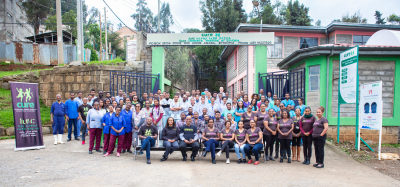A sustainable solution to medical care in Africa

Imagine your child was born with a correctable but debilitating bone condition. The closest surgeon is in a city hundreds of miles away, maybe thousands, and you have no car. Bus tickets are expensive, so you sell something of value. You buy two tickets and manage the long bus ride with the infant.
After you arrive at the hospital, you are told to wait many days until your child can be treated. You two spend the daytime watching people pass by and the nighttime wherever you can.
On the day of the surgery, you are required to pay up-front for your child’s procedure. It’s not just expensive — it’s more money than you could ever expect to earn in your lifetime. Alternatively, you are told that the hospital lacks the capacity or the expertise to care for your child. You lose hope that anything can be done and come to the realization that your child will never be able to go to school, find work, or raise a family of their own. In short, they will be left behind.
This is a memory, a current situation, or a future occurrence for hundreds of thousands of parents across Africa. The continent’s chronic and severe shortage of hospital capacity and surgical expertise increases costs, travel, and time for treatment beyond what is possible for millions.
The need is enormous and ever-growing as populations swell across the continent. The lack of hospital capacity and specialist surgeons means that children with treatable disabilities or those who desperately need help following injury or infection often do not receive the care they need. In many countries in Africa, there is fewer than one orthopedic surgeon for every 1 million people — compared to the United States, where there is one for every 11,000 people.
The solution is not just about providing high-quality care; it is about inspiring and equipping the next generation of talented surgeons to do their utmost for these children.
The Christian nonprofit organization I serve with,CURE International, operates eight no-cost children’s hospitals across Africa and the Philippines. Every year, thousands of children receive excellent surgical care, restoring their hope, dignity, and opportunity. Crucially, we work alongside our colleagues in public hospitals, offering a dedicated training program for national surgeons where they develop their skills in either pediatric orthopedic surgery, neurosurgery, or plastic reconstructive surgery.
Through these programs, many go on to dedicate their careers to improving the lives of the most vulnerable children in the world. Children with operable disabilities need not be left behind in life — the cycle can be broken.
Earlier this month, three talented Ethiopian surgeons successfully graduated from the pediatric orthopedic fellowship program at CURE Children’s Hospital of Ethiopia. Dr. Bekalu, Dr. Netsanet, and Dr. Wubshet are now working in two of the largest public hospitals in Ethiopia. They, in turn, will train and inspire fellow national surgeons in how to provide the highest standard of pediatric reconstructive surgery. This is essential: there is a huge number of children on our waiting list at CURE Ethiopia. Through intentional, high-quality training programs, the next generation of children could receive the timely, local, and excellent care that they so desperately need and deserve. Sustainably for generations.
Why does this matter to Christians in particular?
As Christians, we are disciples of Jesus. Following Him, learning from Him, and emulating Him as He teaches, guides, and instructs us. This model of discipleship changed the world forever! The model in a clinical setting is just as powerful, but it requires intentionality and leadership when the demands of day-to-day medical care are already stretching.
Creating dedicated residency and fellowship programs that align with the national training structure takes time, effort, and resources. Without these initiatives, an opportunity is missed every time a patient is cared for by a specialist when no trainee is present. As Christians, we should be the very first to recognize this. Such collaborations with our colleagues in the national public hospitals bear great fruit as we work together to train the next generation of talented local surgeons.
CURE International is not alone in this effort. Many organizations, including the Pan-African Academy of Christian Surgeons,AO Alliance, Mercy Ships, andMedSend, are doing transformative work to solve immediate and long-term medical shortages.
This Christmas season, let us recognize that we could put our resources and God-given gifts into supporting organizations that invest in medical training. Long-term, these investments will reap a return for generations to come.
Dr. Rick Gardner is the Chief Medical Officer at CURE International and an orthopedic surgeon at CURE Children’s Hospital of Zimbabwe.



























